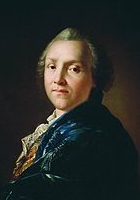Alexander Sumarokov
Alexander Sumarokov Poems
In vain I hide my heart's fierce pain,
In vain pretend to inner calm.
I can't be calm a single hour,
...
My sighs, fly to my sweetheart, I want you to explain
And tell her how I miss her and how I suffer pain.
...
You looked for me but now that time is gone for ever,
And all the joy we shared is lost, as I can see.
You are unfaithful to me, and you lost my favour,
...
My fair girl, don't waist your time for nothing, easily,
Love someone, - all is vanity without love,
Be nice and good, don't lose the charm you have,
...
Alexander Sumarokov Biography
Alexander Petrovich Sumarokov (Russian: Алекса́ндр Петро́вич Сумаро́ков; 25 November 1717 [O.S. 14 November], Moscow – 12 October 1777 [O.S. 1 October], Moscow) was a Russian poet and playwright who single-handedly created classical theatre in Russia, thus assisting Mikhail Lomonosov to inaugurate the reign of classicism in Russian literature. Born of a good family of Muscovite gentry, Sumarokov was educated at the Cadet School in Petersburg, where he acquired an intimate familiarity with French polite learning. Neither an aristocratic dilettante like Antiokh Kantemir nor a learned professor like Vasily Trediakovsky, he was the first gentleman in Russia to choose the profession of letters. He consequently may be called the father of the Russian literary profession.[1] His pursuits did not undermine his position in the family; indeed, his grandson was made a count and, when the Sumarokov family became extinct a century later, the title eventually passed to Prince Felix Yusupov, who also styled himself Count Sumarokov-Elston in memory of his illustrious ancestor. Sumarokov wrote much and regularly, chiefly in those literary kinds neglected by Lomonosov. His principal importance rests in his plays, among which Khorev (1749) is regarded as the first regular Russian drama. He ran the first permanent public theatre in the Russian capital, where he worked with the likes of Fyodor Volkov and Ivan Dmitrievsky. His plays were based on the subjects taken from Russian history (Dmitry Samozvanets), proto-Russian legends (Khorev) or on Shakespearean plots (Makbet, Hamlet). D.S. Mirsky believed that there could be no doubt "the good acting made the reputation of Sumarokov, as the literary value of his plays is small. His tragedies are a stultification of the classical method; their Alexandrine couplets are exceedingly harsh; their characters are marionettes. His comedies are adaptations of French plays, with a feeble sprinkling of Russian traits. Their dialogue is a stilted prose that had never been spoken by anyone and reeked of translation". Sumarokov's non-dramatic work is by no means negligible. His fables are the first attempt in a genre that was destined to flourish in Russia with particular vigor. His satires, in which he occasionally imitates the manner of popular poetry, are racy and witty attacks against the government clerks and officers of law. His songs, of all his writings, still attract readers of poetry. They are remarkable for a prodigious metrical inventiveness and a genuine gift of melody. In subject matter they are entirely within the pale of classical, conventional love poetry. Sumarokov's literary criticism is usually carping and superficial, but it did much to inculcate on the Russian public the canons of classical taste. He was a loyal follower of Voltaire, with whom he prided himself on having exchanged several letters. Vain and self-conscious, Sumarokov considered himself a Russian Racine and Voltaire in one. In personal relations he was irritable, touchy, and often petty. But his exacting touchiness contributed, almost as much as did Lomonosov's calm dignity, to raise the profession of the pen and to give it a definite place in society. His daughter Ekaterina, an 18th-century poet, is often considered to be the first Russian woman writer, as she, together with Elizaveta Kheraskova (ru) and Alexandra Rzhevskaia (ru) were the first women to see their works printed in Russian journals.)
The Best Poem Of Alexander Sumarokov
In vain I hide my heart's fierce pain
In vain I hide my heart's fierce pain,
In vain pretend to inner calm.
I can't be calm a single hour,
I can't no matter how I try.
My heart by sighs, my eyes by tears,
reveal the secret misery.
You make all my efforts vain,
you, who stole my liberty!
Bringing a savage fate to me,
you troubled my spirit's peace,
you changed my freedom to a jail,
you turned my delight to sorrow.
And secretly, to my bitterest hurt,
perhaps you sigh for some other woman,
perhaps devoured by a useless passion,
as I for you, you suffer too for her.
I long to see you: when I do I'm mad,
anxious, lest my eyes give me away:
I'm troubled in your presence, in your absence
I'm sad that you can't know how I love.
Shame tries to drive desire from my heart
while love in turn tries to drive out shame.
And in this fierce conflict thought is clouded,
the heart is torn, it suffers, and it burns.
So I fling myself from torment to torment.
I want to show my heart, ashamed to do it,
I don't know what I want, oh, that's true,
what I do know is I'm filled with sorrow.
I know my mind's held prisoner by you,
wherever I am it conjures your dear image:
I know, consumed by the cruellest passion,
there's no way to forget you on this earth.
